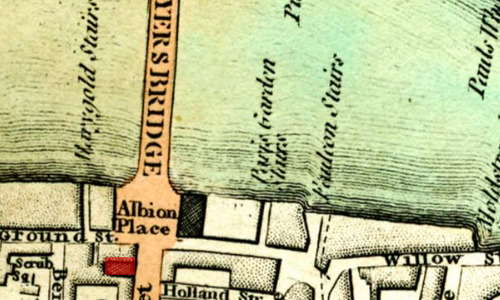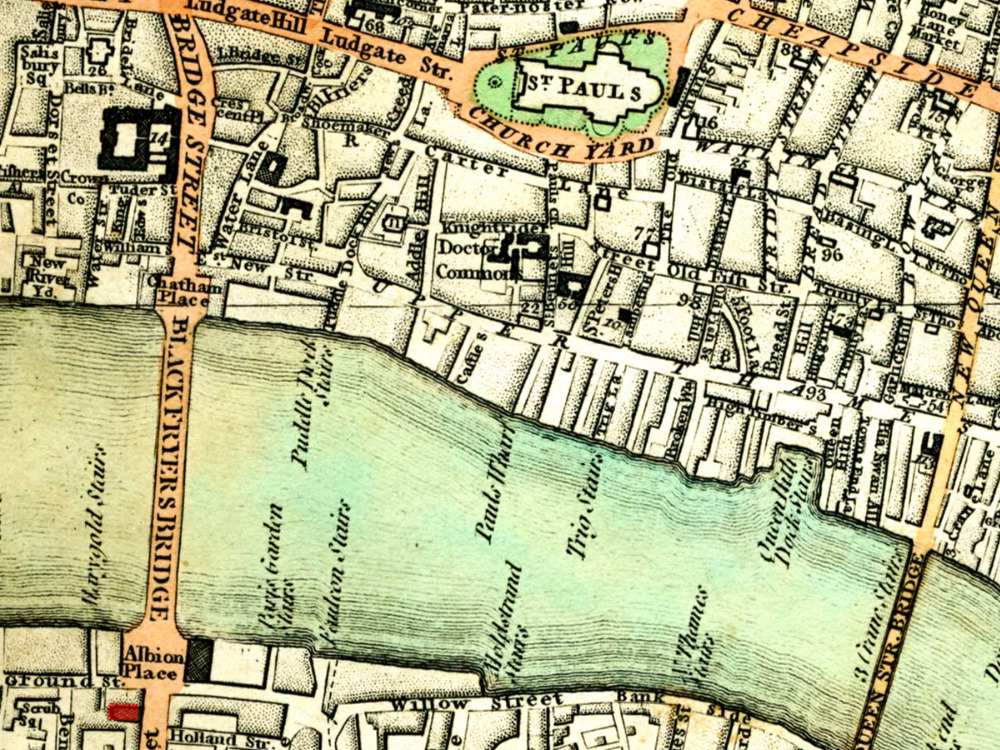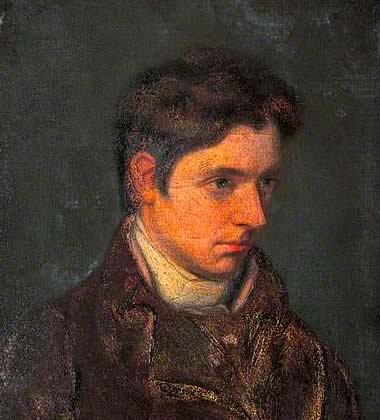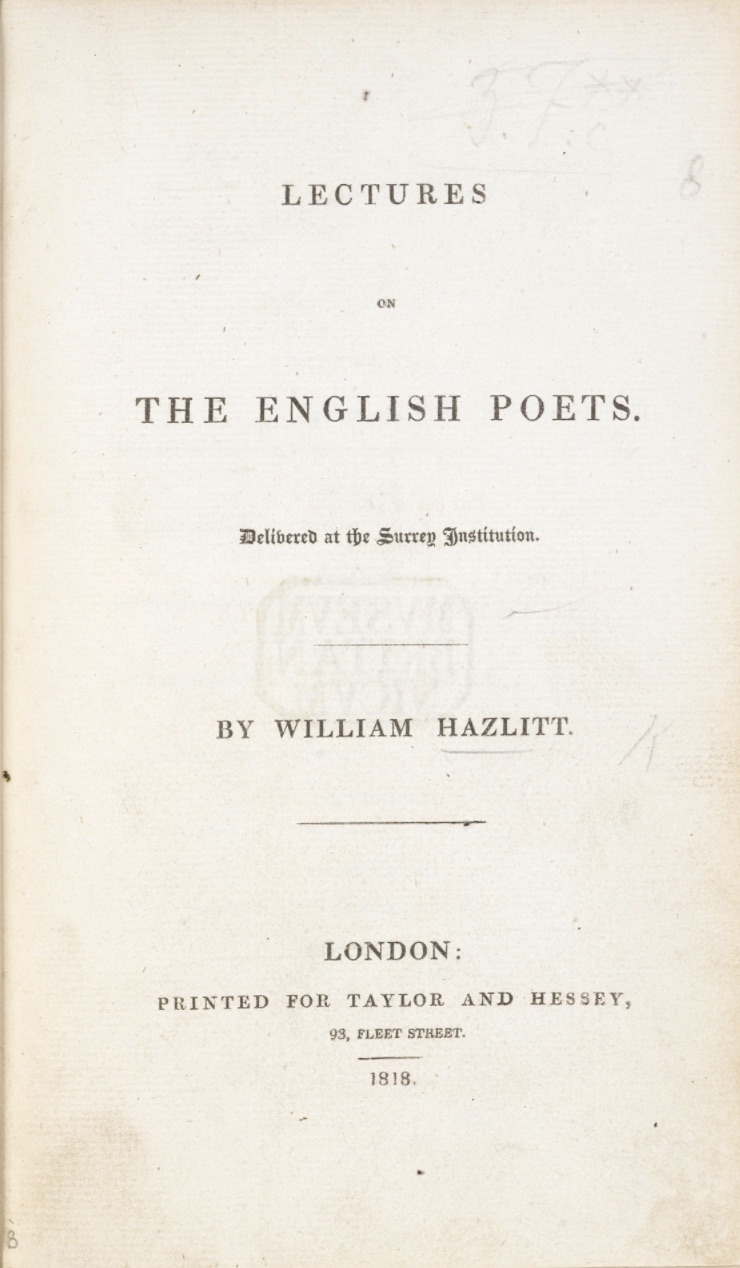27 January 1818: Hazlitt’s on the English Poets & Wordsworth’s Subjectivity; the Poems of January 1818
Surrey Institution, Blackfriars Road, London


William Hazlitt gives three lectures on English poets at the Surrey Institution during January, with more continuing into February and early March. Keats almost certainly attends the third in this series on 27 January, as well as another on 3 February. Keats, we know, has great respect for Hazlitt’s critical tastes, dating from at least mid-1817.
After condemning poets of the modern school of poetry
for excessively expressing a
morbid feeling and devouring egotism,
Hazlitt notes that Shakespeare and Milton
owe their power over the human mind to their having had a deeper sense than others
of what
was grand in the objects of nature, or affecting in the events of human life.
This
begins to resonate hugely with Keats, who, in his poetic development, now attempts
to go
beyond romance and lighter, pleasurable, and occasional topics and work toward subjects
of
a deeper sense
—objects of nature
and events of human life.
Keats is also aware of Hazlitt’s comments about Wordsworth’s style of poetry, that, according to Hazlitt, Wordsworth’s intense
intellectual egotism swallows up every thing
(first expressed by Hazlitt in The Examiner in 1814). In the 1817 Round
Table discussion of Wordsworth (gathered essays from The
Examiner), Hazlitt notes that Wordsworth sees all things in himself [. . .] He
only sympathizes with those forms of feeling which mingle at once with his own identity
[. .
.] The power of his mind preys upon itself. It is as if there were nothing, but himself
and
the universe.
Hazlitt notes that no matter what speaker or narrator Wordsworth employs,
they are the same character: Wordsworth. [H]is thoughts are his real subject,
writes
Hazlitt. But, Hazlitt notes, Wordsworth is also a deeply contemplative and philosophical
poet,
and, with subtlety and profundity, he describes the love of nature better than any
other
poet.


Throughout 1818, and almost certainly following Hazlitt’s complicating views on Wordsworth, Keats is keen to distinguish his own poetical Character
from
the wordsworthian or egotistical sublime
and the whims of an egotist,
which
leads to poetry that has a palpable design upon us
(27 Oct 1818 and 3 Feb 1818). This
determined self-differentiation from Wordsworth (whom Keats met a number of times
fairly
recently) is crucial for Keats in developing his own style of reflection and expression,
inasmuch as it also means he desires to comprehend Wordsworth’s weighty achievement,
which
Keats finds to be considerable and pivotal in his own direction. More specifically,
Keats
realizes that for his poetry to progress, he needs to go as deep as, or at least engage,
Wordsworth’s ideas about the connection between joy and suffering—expressed in Wordsworth’s
dominating trope of the human heart. And over the next few months (and reflected in
a critical
letter of 3 May to John Hamilton Reynolds),
Keats is determined to understand if Wordsworth’s explorative
genius is limited or
grand in its scope. Practical questions for Keats might be: How do I go as deep as
Wordsworth in a style that is not Wordsworthian?
How do I write poetry with poetic purpose that does not draw attention to that purpose,
but only an overriding sense of Beauty? How do I become the unpoetical poet?


Besides January 1818 being an extremely socially active month, Keats manages to write at least eight poems, though one is left unfinished. Three are incidental and mainly trivial: he has some naughty fun with a dirty little ditty that harks back to an older, bawdy tradition—O blush not so!; he sentimentally celebrates a friend’s mother’s old, beat-up cat in To Mrs. Reynold’s cat; and he advertises his fondness for drinking in Hence burgundy, claret and port).
More is at stake in three of those other January 1818 poems. In them, Keats returns
to his
longest-running topic, one that, paradoxically, both motivates him and holds him back:
articulating his desire and aspirations to be an enduring poet. These poems do, though,
sound
some minor progress in his writing. In particular, his style and voice do not distract
so much
from his sense of subject and purpose. Keats is set off—fevered and flushed—by seeing
what he
believes is a bit of John Milton’s hair that
Leigh Hunt shows him: Lines on Seeing a Lock of Milton’s
Hair praises and, in a way, even worships Milton’s powerful, perdurable poetry;
it is, Keats notes, a poetry that operates beyond time and place and fashion; and
this is
sing3ularly important for Keats, who, as he writes, hopes that with years of work
his voice
might also carry of such lasting depths and powers. Keats, we see, with his ambition
and
self-belief, already has in mind an after time
for his hoped-for better work-to-come.
In On Sitting
Down to Read King Lear Again, Keats marks his
humility in the presence of Shakespeare’s deep, dark tragedy. (We might also note
that Milton
and Shakespeare in these two respective poems are both declared the Chief
of all
writers; Keats, it seems, at this point cannot chose between what she hope are his
great
precursors.) A third poem—When I have fears that I may cease to
be—is also serious and direct in expressing his poetic aspirations. Most of the
sonnet crosses over into his fears that he might not live long enough to express all
that he
might feel or see, and that (striking a kind of Byronic pose of standing alone) fame
might
fade before his time comes. There is, also, a last poem of the month, God of the meridian, a kind of
experiment that seems to ramble toward the idea that, somehow, the God of Song
might do
something to temper or position his poetic feelings; but that is about all; the poem
struggles
just to physically place the speaker. Behind all of these poems, Keats recognizes
that he will
need to develop his poetic skills to keep pace with his penetrative poetics.
Keats also expresses unease with his long poem, Endymion, which is in early stages of
going to press: I am convinced now that my Poem will not sell.
He’s right. But this
realization is a good thing, since, in the process of preparing his poem for publication,
he
comes to critically assess its significant shortcomings—a random, stretched plot;
too much
aimless description; an overly dainty tone (especially in the dangling, jingling couplets,
where the arbitrary connections of sounds determines sense, rather than supporting
it) that
does not always fuse with the poem’s more sensual moments; and a thematics (variations
on the
ideal/real binary) that hardly displays much originality.
Endymion’s
shortcomings and prospects makes Keats sound an ultimatum: he writes that he will
give his
career as a poet three more months. After that, he will seek other employment (Home or
abroad
) or find a cheap way to retire
in the country. But this is momentary
bluster, brought on by both financial pressures and relatively little poetic progress
and
success. Pressures and dissatisfaction, however, do not stop his lingering aspirations;
and,
for the better, Endymion serves to remind Keats of the kind of
poetry he will, hereafter, not write. What he is brewing is an epic poem based on the
Greek Hyperion story (the conflict between the Titans and the Olympians), and Keats
plans to
write his poem in a more direct, elevated style that, in part, and at least initially,
owes
something to Milton’s influence. Hyperion will be (and in fact becomes, in two impressive but
incomplete incarnations) the anti-Endymion. But Keats is eventually stymied
by either his inability to fashion an engaging, continuous narrative, or the feeling
that
tonally and stylistically the poem does not represent his own poetic voice. As we
will see,
the lyrical impulse in Keats needs to be met on his own terms—his own critical and
imaginatively capable terms—and not on the accomplishments or style of his precursor
poets.
The end of January shows Keats having, as usual, financial issues. He has received
more
tricklings of money from the trustee (Richard
Abbey) of his inherited and apparently dwindling family funds, but as he writes his
brothers in a letter postmarked 30 January, money he owes to friends nearly swallowed up
the Balance.

